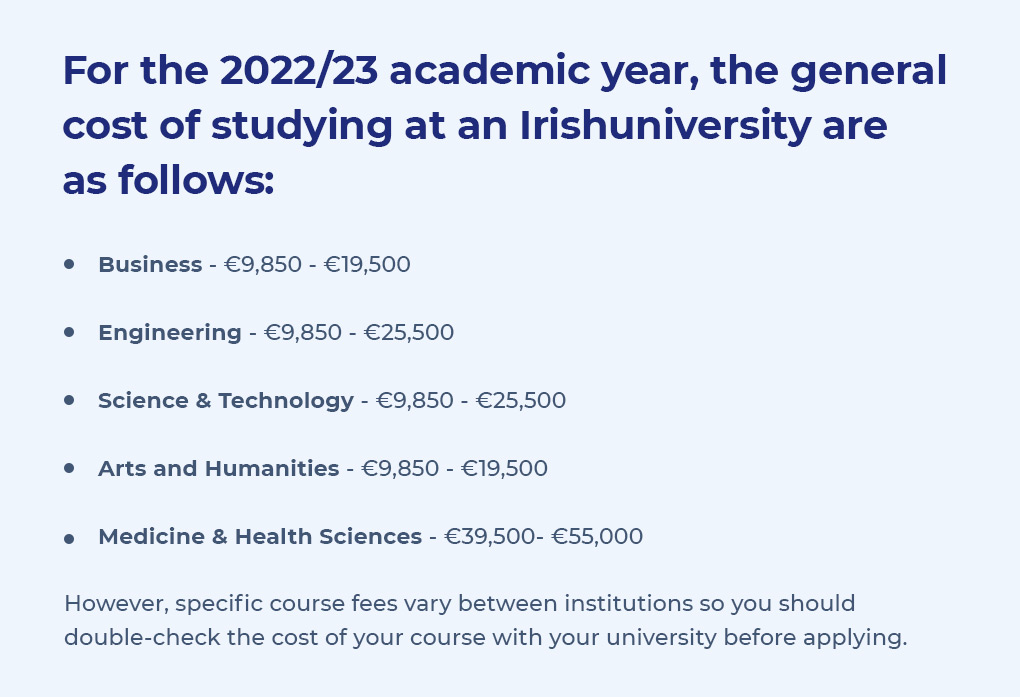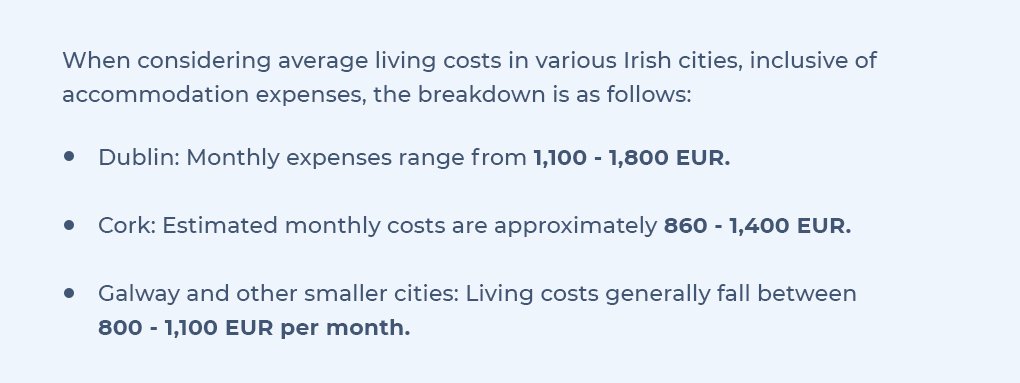

Studying abroad is an exciting and transformative experience that opens a world of opportunities. Ireland, with its rich history, vibrant culture, and esteemed education system, has become an increasingly popular destination for international students. However, along with the allure of higher education in Ireland, comes the practical consideration of cost.
In this comprehensive guide, we will delve into the various aspects that contribute to the cost of studying in Ireland, including tuition fees, living expenses, scholarships, and budgeting tips.
In this blog we will cover the following topic:
Tuition fees in Ireland vary depending on the level of education and the chosen institution. Typically, higher education institutions in Ireland offer programs at undergraduate, postgraduate, and doctoral levels. Here's an overview of the approximate tuition fees for each level:

It's important to note that these figures are approximate and can vary significantly between universities and courses. Additionally, the cost of tuition for programs in fields like medicine and specialized courses might be higher than the averages mentioned above.
The expenses associated with student living in Ireland tend to exceed the European average, requiring an estimated monthly budget ranging between 550 - 1,000 EUR.

Regarding student accommodation in Ireland, higher education institutions offer options like student residence halls, which typically surpass the European norm of 200 - 300 EUR. Finding suitable accommodation can be challenging due to the limited availability and high demand.
Apart from residence halls, alternative options include renting or sharing an apartment, as well as opting to live with an Irish host family.
Beyond accommodation and transportation, there are other essential expenses to consider during your study period:
For a comprehensive overview of prices and costs in Ireland, the Numbeo website is a valuable resource to explore.
Health insurance is mandatory for international students studying in Ireland. The cost of health insurance can vary based on the duration of your stay and the type of coverage you choose. As of my last update, students from the European Union (EU) and the European Economic Area (EEA) are eligible for the European Health Insurance Card (EHIC), which provides access to public healthcare in Ireland. Non-EU/EEA students are required to purchase private health insurance, which can cost around €300 to €1,000 per year.
To know more about Medical and Health care facilities for International Students in Ireland read our blog

Embarking on a journey of higher education entails investing in essential resources to facilitate effective learning. In Ireland, as is the norm worldwide, the cost of study materials and equipment can vary significantly depending on the chosen academic discipline.
I. Books and Textbooks: Ireland's esteemed educational institutions, offering a diverse array of programs and recognized globally, prioritize up-to-date curricula aligned with international standards. Consequently, students often find themselves acquiring the latest editions of textbooks to support their studies.
For certain courses, particularly those within the humanities and social sciences, the reliance on books might be more pronounced, leading to an annual expenditure ranging between EUR 200 to EUR 500.
II. Specialized Equipment: Students pursuing fields such as sciences, engineering, fine arts, or design might encounter the need for specialized equipment. This could encompass items like lab gear, safety gear, technical instruments, high-quality cameras, or art supplies.
The cumulative cost of these specialized tools can escalate swiftly, potentially pushing the yearly budget to a range of EUR 1000 - EUR 1500 or even higher in certain specialized disciplines.
III. Digital Resources and Software: In the contemporary academic landscape, a substantial portion of learning takes place in the digital realm. Many courses mandate access to online journals, e-books, or the purchase of specific software for tasks like data analysis, design, or programming.
Incorporating these digital resources and software tools can contribute an additional EUR 100 to EUR 500 to the yearly expenditure, contingent on the specific demands of the course.
IV. Stationery and Miscellaneous Supplies: While seemingly minor, expenses related to notebooks, pens, drawing implements, printing, and miscellaneous supplies can accumulate to a noteworthy portion of the yearly budget.
Collectively, these seemingly inconspicuous items can sum up to around EUR 100 - EUR 300 on an annual basis.
V. Second-hand Options and Library Resources: To mitigate the impact of these costs, many students in Ireland turn to second-hand bookstores or explore opportunities to purchase materials from seniors who have completed the same courses. Additionally, the libraries associated with Irish universities are well-equipped and frequently offer students access to essential textbooks and digital resources, proving to be a valuable means of reducing overall study-related expenses.
Ireland, renowned for its esteemed educational institutions and diverse academic offerings, continues to captivate international students seeking a quality education. However, the preliminary steps, including financial commitments associated with entrance and proficiency exams, can pose a challenge for aspirants planning to embark on their educational journey in the country.

When considering studying in Ireland, the initial requirement involves obtaining a legitimate study visa, which carries its associated expenses (approximately €60).
To know more about Student Visa for Ireland Read our Blog: A comprehensive Guide to Student Visa for Ireland: Types, Requirements, and Application Process

Ireland, often referred to as the "Emerald Isle," is renowned for its world-class education and captivating landscapes. Its blend of rich cultural heritage, lively cities, and diverse recreational options offers international students a multifaceted experience beyond the classroom.
As a student studying in Ireland, your journey is not confined to academic pursuits; exploring the country's scenic beauty and dynamic culture is an integral part of the overall adventure. However, partaking in these experiences does entail certain financial considerations.
While enjoying the vibrant Irish culture and its natural wonders, prudent budgeting and the strategic use of available discounts can contribute to a well-rounded and enriching experience during your time studying in Ireland.

Navigating the financial aspects of studying abroad can be a challenge, but part-time job opportunities can play a significant role in alleviating the financial burden. In Ireland, a country renowned for its quality education and welcoming environment, international students have a variety of part-time job options to consider, each offering a potential pathway to help cover study-related costs.
Working Hours: Tutors often have flexible schedules, and the hours can vary based on your availability and the students' needs. Tutoring sessions can be arranged during evenings or weekends to accommodate both your academic commitments and the students' study times.
Salary: Tutoring rates can differ depending on the subject, level of expertise, and demand. On average, tutors can earn around EUR 10 to EUR 20 per hour.
Working Hours: Jobs in the hospitality industry typically involve shifts, which can include evenings, weekends, and even holidays. Part-time servers and bartenders might work around 15 to 25 hours per week.
Salary: Wages for servers and bartenders usually include an hourly rate, and additional income can come from tips. The hourly wage can range from EUR 9 to EUR 12.
Working Hours: Barista roles often align with café opening hours. This means working shifts during mornings, afternoons, and weekends. The working hours might amount to around 20 to 30 hours per week.
Salary: Baristas typically receive an hourly wage, which can range from EUR 9 to EUR 11. Tips can also contribute to your overall earnings.
Working Hours: Research assistant roles can be part-time, with the hours varying based on the project's demands and your availability. These roles are often flexible, and you might need to coordinate with the professor or research team.
Salary: The pay for research assistant positions can vary widely depending on the academic field, project complexity, and institution. On average, research assistants can earn around EUR 10 to EUR 15 per hour.
Working Hours: Translating work can be flexible, especially if you're freelancing. You can choose projects that align with your schedule. However, working hours might vary depending on deadlines and project volume.
Salary: Translation rates depend on language pairs, complexity, and industry. Translators can earn around EUR 15 to EUR 25 per hour or even more for specialized languages.
Working Hours: Demonstrator roles are often tied to specific class schedules. You might need to assist during laboratory sessions, which could be a few hours per week. These roles are likely to align with your academic timetable.
Salary: Payment for demonstrator roles varies based on the institution and the specific class. Hourly rates can range from EUR 10 to EUR 20.
It's important to note that the working hours and salary ranges provided are approximate and can vary depending on factors such as location, your experience, and the specific employer.
Before accepting any part-time job, ensure you have a clear understanding of the terms, responsibilities, and remuneration.

Scholarships in Ireland serve as a bridge to making quality education accessible to a diverse range of international students. Each scholarship program has its own eligibility criteria, application process, and financial benefits. Let's explore these aspects for some of the prominent scholarship opportunities in Ireland:
Eligibility: These scholarships are available to students from 161 countries, including India and others. Applicants must secure admission to a recognized Irish institution.
Application Process: Students can apply directly to the respective institution they plan to attend. The application procedure may vary, so carefully review the scholarship guidelines provided by the institution.
Financial Benefits: Undergraduate scholarships offer 6,000 EUR each, while postgraduate scholarships provide 10,000 EUR per awardee.
Eligibility: Fulbright scholarships are open to U.S. citizens who wish to engage in educational and research activities in Ireland.
Application Process: Applicants need to submit an online application through the Fulbright Program's official website. The application requires essays, letters of recommendation, transcripts, and a project proposal.
Financial Benefits: Fulbright scholarships provide funding for travel, living expenses, and research-related costs.
Eligibility: This scholarship targets high-achieving students from the USA who are applying for full-time, undergraduate programs at UCD.
Application Process: Eligible students are automatically considered for this scholarship upon application to UCD. No separate scholarship application is required.
Financial Benefits: The UCD Global Excellence Undergraduate Scholarship provides a tuition fee reduction of up to 50% for the first year of study.
Eligibility: This scholarship targets students pursuing an MA in Anglo-Irish Literature and Drama at UCD.
Application Process: Eligible students apply by submitting a personal statement and a writing sample.
Financial Benefits: The scholarship provides a stipend of 5,000 EUR.
Eligibility criteria, application procedures, and financial benefits vary for each scholarship program. It's crucial to thoroughly review the official scholarship websites or contact the respective institutions for accurate and up-to-date information.
Applying for scholarships generally involves submitting required documents such as transcripts, letters of recommendation, a statement of purpose, and, in some cases, a research proposal. Deadlines can also vary, so ensure to meet the specified application timelines.
Scholarships in Ireland play a pivotal role in supporting students' academic pursuits. Careful research, meticulous application, and adhering to the given guidelines will enhance your chances of securing these opportunities, making your study experience in Ireland not only enriching but financially sustainable as well.

When considering the financial landscape of pursuing education overseas, Ireland presents a compelling case, much like its counterpart Australia. A close examination, paralleling renowned academic giants such as the USA and the UK, often reveals an intriguing insight. The financial obligations associated with studying in Ireland frequently fall in line with or even position themselves below those prevalent in the mentioned nations. This observation becomes notably pronounced when assessing the returns on investment encompassing pivotal aspects like the quality of education, career opportunities, and the overall quality of life.
Engaging in a comprehensive evaluation of the interplay between educational excellence and fiscal commitments across prominent international educational hubs unmistakably underscores Ireland's position as a cost-effective haven for aspiring learners. Ireland doesn't solely offer an advantage in terms of living expenses and tuition fees compared to countries like the US and the UK, but it also proudly boasts a globally esteemed standard of living.
In summary, studying in Ireland emerges not only as a pathway to quality education but also as a prudent financial choice that enables students to achieve their academic ambitions without bearing an excessive financial burden.

Managing finances while studying abroad is a crucial skill. Here are some practical tips to help you budget effectively and make the most of your financial resources:
Studying in Ireland provides an enriching educational experience amidst a culturally rich environment. While the cost of studying in Ireland encompasses tuition fees, living expenses, health insurance, and more, careful planning and research can help you manage these costs. From estimating living expenses to exploring part-time job opportunities and scholarships, international students have various avenues to make their education in Ireland financially viable. By understanding the different aspects of the cost of study in Ireland, you can embark on your academic journey well-prepared and with confidence.

Studying abroad is an exciting and life-changing experience that offers students a chance to gain a global perspective and valuable exposure ...

In our rapidly globalizing world, where boundaries are melting away and opportunities abound, proficiency in the English language has become ...

Choosing to pursue higher education abroad is an exciting and life-changing decision. Among the plethora of options available to internationa...

Studying abroad is a life-altering adventure that opens doors to new cultures, experiences, and opportunities. Among the plethora of global s...

Australia, renowned for its world-class education and diverse cultural experiences, continues to be a favoured destination for international ...

Australia is not just famous for its iconic Sydney Opera House, the Great Barrier Reef, and its unique wildlife; it is also recognized global...

Studying abroad is a life-changing decision, and with so many options available, it can be overwhelming to choose the right country and univers...

As of March 2022, Australia has seen a consistent rise in its international student numbers, with enrolments reaching 440,219. This marks an ...